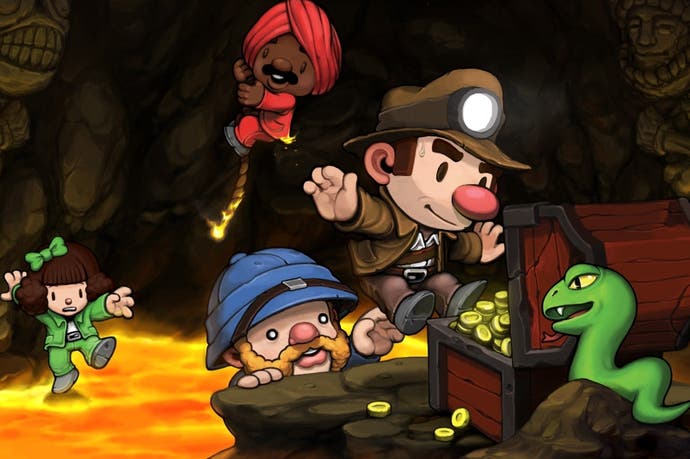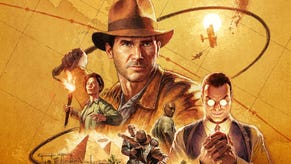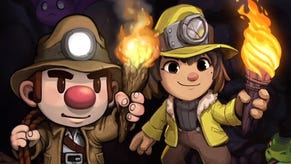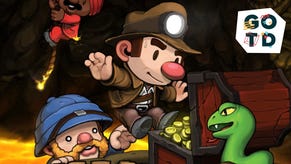My daughter's going to learn vital life skills from Spelunky
Not really. Well. Maybe...
My daughter's due date was this Thursday. There's no sign of her so far but, like any father-to-be, I've spent the last few days slightly awestruck by the responsibility I'm facing. I look at the trees outside of the office window and think, cripes, she's not going to know what trees are. Somebody's going to have to tell her about trees. And parliamentary democracy. And Tabasco sauce.
A lot of the time, that person's probably me. It's up to my wife and I to give this child not just any material comforts we can hustle together for her, but also a decent grounding in morality and some of the basic skills she'll need for life. This poses an obvious question, right? Namely: how can I get someone else - or something else - to do the really tricky stuff for me? Well, I think I have an answer.
It turns out that my daughter's going to play an awful lot of Spelunky.
Spelunky, in case you've missed it, is a game about moving through a deadly, Indiana Jones-ish world of traps and spike pits and horrible ghouls, using only your wits - and your knowledge of the way the game's ecology operates - to keep you alive while you hunt for untold treasures. The world's always changing, because the game generates its environments procedurally, and yet core elements of it remain dependable throughout. The landscape shifts around, but the rules that govern it never do.
I've been playing Spelunky for two or three years now, and one of the things about Derek Yu's masterpiece that continues to dazzle is how elegantly it provides an introduction to the quieter virtues. Greed is the root of almost all disaster and downfall in Spelunky, for example, while success requires a humble acknowledgement that luck plays a huge role in life (was it you who made it to Olmec's head, or was it the fact that you stumbled on a jetpack so early?). Spelunky also encourages a respectful approach to the environment. Don't bate any snakes unless you really have to, and let sleeping bats slumber where you can. Shoot all the bluejays you want, if you can hit 'em, but it's a sin to kill a mockingbird.
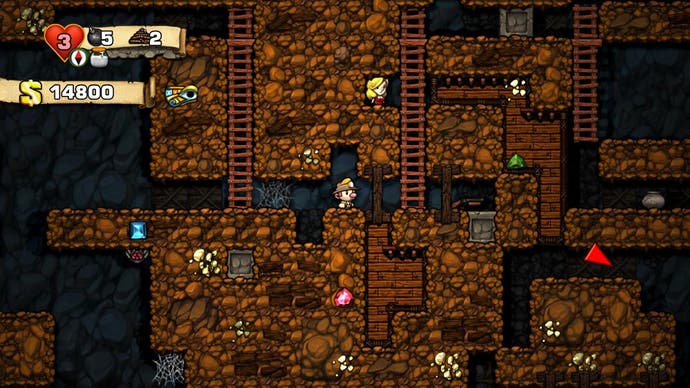
On top of that, Spelunky teaches you the value of things. Should the world descend into zombie-riddled chaos a decade from now, my daughter will hopefully already know that a bomb, in most circumstances, is worth more than a rope, and that a shotgun, on balance, is preferred to climbing gloves. Aside from these sorts of specifics, though, Spelunky's a primer in the nuances of more generalised values, too. My daughter will be able to weigh up whether the potential for additional riches is worth leaving a position of relative safety for, and she'll also be able to appreciate the advantages of living in the moment. By and large, I think it's best to spend your gold as quickly as possible in Spelunky: life is short and filled with disasters, so why rob yourself of the chance to enjoy the time you spend on earth in the company of a parachute or spike shoes?
There's more. Spelunky will teach my daughter to take things at a careful pace but not to dawdle (granted, this is for fear of ghosts - I may have to polish this lesson up a little in the real world), and it will teach her to make the most of what she has to hand. Sure, you've got five bombs now, but you should still tackle things as if you only have one bomb. Spend money like there's no tomorrow, but use your most treasured possessions wisely.
Derek Yu will show her how to learn from her mistakes, how to make clear decisions under pressure, and how to consider separate moving parts with a certain degree of imagination: how can I use these tools with this situation? What might happen if I did that? Spelunky, like Einstein, is a great believer in the power of thought experiments. And, like Einstein, Spelunky is aware that each action comes with its own reaction.
Spelunky's even a chance to share. I don't expect - and I don't really want - my daughter to look to me for the things she might enjoy in life. I want her to follow her own instincts, even if they lead to One Direction. That said, it will be nice to give her a potent dose of a few things that have always worked a strange magic as far as I'm concerned: video games, for sure, but also pulpy fictions where pressure plates inevitably trigger blow darts and where stealing an idol will generally unleash a rolling boulder. (Aside: you can survive on top of the rolling boulder if you time it right. I did this yesterday - it angered Kali and turned shopkeepers against me, but it was brilliant.)
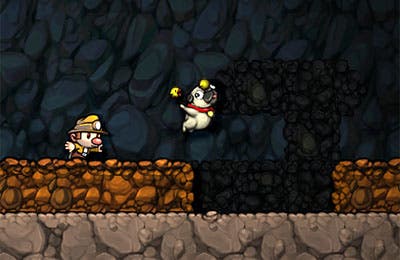
Most importantly, though, I realise that I was an innately fearful child, and so I hope Spelunky will help steer my daughter away from a life wasted with empty fretting. Spelunky's universe is often deadly, but it's loaded with wonderful secrets, too, and it suggests that even the worst threats can be overcome with an inquisitive, playful nature, a positive attitude and a quick mind.
I believe that, I think. If you learn how a yeti works in Spelunky, your days of quaking whenever you see one are pretty much done with - yetis become just another challenge to tackle, and they lose a good chunk of their abstract power to scare. Spelunky may put you at the centre of a creeping, malignant environment, in other words, but it promises that everything in that environment eventually makes some kind of sense, and it rewards those who approach things with their eyes open and their spirits primed for new experiences.
Apologies, this has been a stupid, self-indulgent ramble, I know, but it does get at a problem I've been pondering over the last few months as I've been learning about teething, investing in strange items with names like the Diaper Genie (not as much fun as it sounds, alas) and putting together cots - and then putting them together again properly. The problem is complex. When I was a kid, games were always an illicit pastime. As an adult, I understand that they come with many more positive benefits than my parents saw in them. They have enriched my life, and I'm left wondering: how can my daughter and I get the most out of this powerful form of magic that games represent?
Spelunky's creatively deep, empirically rigorous, and it's also designed with a real love for its various individual elements. My wish for my daughter is that she's capable, resilient, self-confident, and aware of the value of playfulness - and that she will want to move through the world in a free-wheeling, open-minded manner, eager to see what comes next. I want her to embrace what the ratings people refer to, with a clunky sort of poetry, as "comic mischief" and to see every new day as a potential adventure. I think I've found the perfect tutor.
[Wait, it's Teen-rated? I'm a monster! She'll have to wait for a good few years before she can enjoy it, then.]
